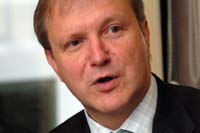Turkey must improve minority rights, enhance freedom of expression, religion and press

The European Commission expressed its concern over lack of minority rights, and press and religion freedom in Turkey .
In its annual report on Turkey, the EU executive repeated that Ankara must normalize its relations with EU member Cyprus and honor a 2005 pact to open its ports and airports to the island republic.
The pace of reforms "has slowed down" since Turkey's membership negotiations opened two years ago, and "significant further efforts are needed" in crucial areas, said the report. Human rights issues, a dispute over Cyprus and other problems hinder the bid, the report said.
The assessment earned strong reaction from Ankara, which urged EU countries not to impede Turkey's membership bid with what it called "obstacles that are not related" to the process.
The EU is particularly concerned about Article 301 of the Turkish penal code, which makes it a crime to insult Turkish identity or the country's institutions. The article has been used to prosecute people for making comments about the mass killings of Armenians by Turks in the early 20th century.
"It is not acceptable that writers, journalists, academics and other intellectuals ... are prosecuted for simply expressing a critical but completely nonviolent opinion," EU Enlargement Commissioner Olli Rehn said when presenting the report.
"The infamous Article 301 must be repealed or amended without delay," he said.
Nobel Prize-winning author Orhan Pamuk and slain ethnic Armenian journalist Hrant Dink were both prosecuted under the law. That period of history has also strained Turkey's relations with the United States since a U.S. House of Representatives panel approved a resolution labeling the killings as genocide.
The report commends the Turkish government for solving a constitutional crisis earlier this year, but says the military - which has vowed to safeguard Turkish secularism - still exerts "significant political influence." It calls for better civilian oversight of the armed forces.
Abdullah Gul, a former foreign minister in Turkey's Islamic-oriented government, was elected president in July after months of confrontation with the secular establishment, with the military threatening to intervene when Gul was first nominated for the post.
Turkey's EU membership talks stalled last year when the EU froze negotiations on eight of 35 so-called "negotiating chapters" - or policy areas - because of Ankara's refusal to open its ports to trade with Cyprus, an EU member since 2004.
The eight chapters will not be opened until Turkey allows Greek Cypriot planes and vessels to use Turkish ports and airports, Rehn said. But he added that negotiations in two new areas - health and consumer policy and trans-European networks - could start in the coming weeks.
The 27-nation EU is divided over whether Turkey, a mainly Muslim country of 71 million people, should one day join the EU. Turkey's accession faces opposition from some member states, such as France and Austria, and the accession talks are expected to last at least a decade.
The EU executive, which evaluates the progress of all EU candidates annually, praised Turkey's economic reforms but chided Turkish authorities for their approach to minority rights, which it said has remained "unchanged" over the past year.
In the southeast of the country, "Turkey needs to create the conditions for the predominantly Kurdish population there to enjoy full rights and freedoms," it said.
The report was published as Turkey was considering military moves against Kurdish rebels in northern Iraq. Kurdish rebels have killed more than 40 Turks in the past month.
The U.S. and Iraq have been pressing Ankara to avoid a major cross-border attack on Kurdish Workers' Party, or PKK, rebel bases out of fear such an incursion would bring instability to what has been one of the calmest areas in Iraq.
"It is important to recognize and comment on the restraint exercised by the Turkish government in the face of continual terrorist attacks," Rehn said. "The international community must support Turkey's efforts to protect its people and fight terrorism while respecting the rule of law, preserving regional peace and refraining from any disproportionate military action."
Subscribe to Pravda.Ru Telegram channel, Facebook, RSS!


